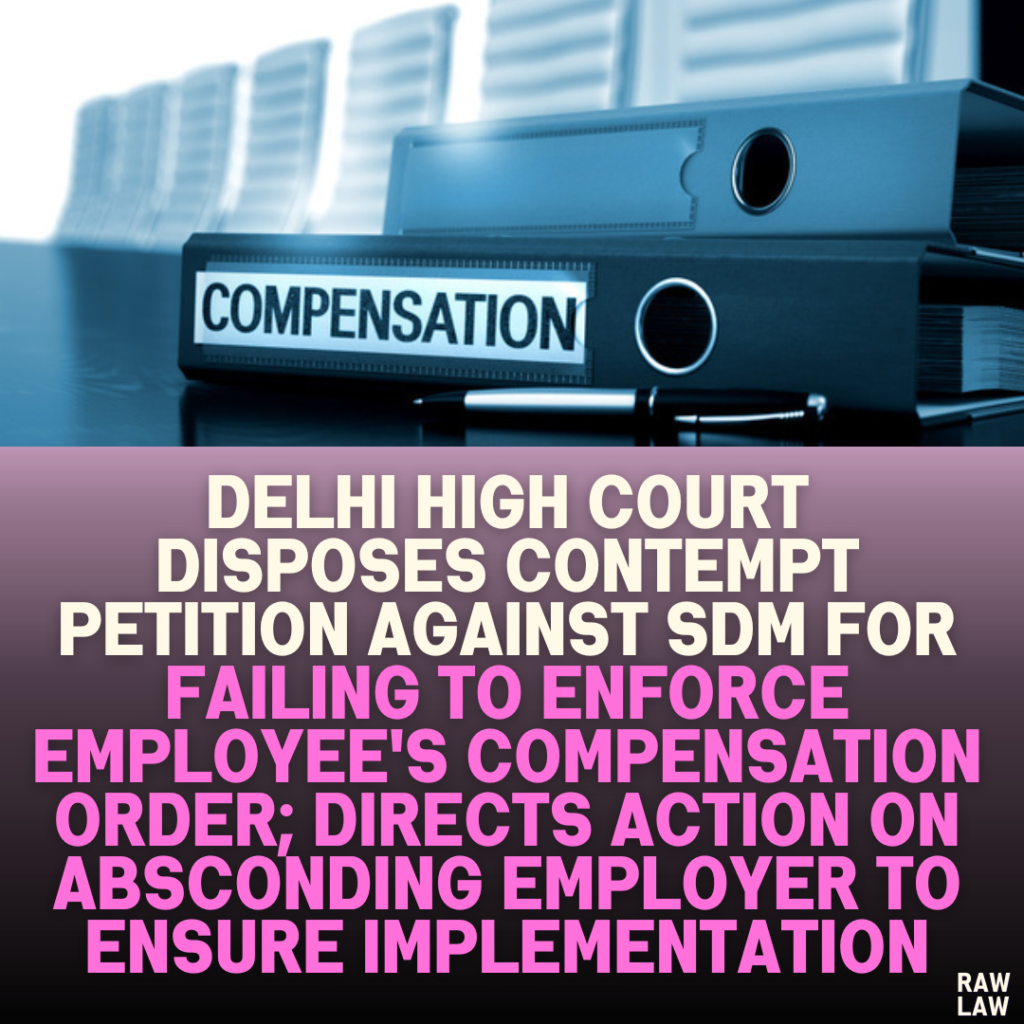Court’s Decision
The Delhi High Court disposed of a contempt petition against the Sub Divisional Magistrate (SDM) for non-compliance with a previous court order directing enforcement of a compensation award. The court gave the petitioner the liberty to file an application for facilitating the arrest or appearance of the absconding employer, thereby ensuring the implementation of the compensation order. The petitioner retained the right to re-approach the court if necessary.
Facts
- The petitioner sought contempt proceedings against the SDM for failure to enforce an order dated April 26, 2018, issued by the Commissioner, Employee’s Compensation, District North. This order directed the employer to pay compensation to the petitioner, and it had attained finality.
- The petitioner previously filed a writ petition (W.P.(C) 157/2023) alleging that the SDM/Commissioner was not taking adequate steps to enforce the compensation order. That writ petition was disposed of by the court with a direction to the SDM to ensure the enforcement application was resolved promptly.
- The petitioner alleged that no meaningful steps had been taken by the SDM since the earlier court directive, prompting the filing of this contempt petition.
Issues
- Did the SDM fail to comply with the court’s previous directive for the enforcement of the compensation award?
- What measures should be taken to ensure the implementation of the compensation order, especially in light of the employer’s absconding?
Petitioner’s Arguments
- The petitioner contended that the SDM demonstrated negligence by failing to implement the court’s directive for enforcing the compensation award.
- The petitioner sought the initiation of contempt proceedings against the SDM for their alleged inaction.
Respondent’s Arguments
- The respondent’s counsel argued that there was no undue delay on the part of the SDM. The main challenge was that the employer had absconded, and arrest warrants had already been issued to secure his presence.
- The respondent assured the court that if the petitioner provided any additional addresses or information regarding the employer, steps would be taken immediately to execute the arrest warrants.
Analysis of the Law
- Employee’s Compensation Act: The case primarily revolves around the enforcement of a compensation award under the Employee’s Compensation Act, 1923. The Act imposes a duty on the authorities to ensure timely disbursal of compensation to the employee.
- Contempt of Court: The petitioner invoked contempt proceedings under the assumption that the SDM had failed to comply with judicial orders. Contempt proceedings are initiated to uphold the authority of the court and ensure compliance with its directives.
- Judicial Supervision: The court’s directive reflects its supervisory role in ensuring administrative authorities adhere to their statutory duties and judicial orders.
Precedent Analysis
Although no specific case laws were cited, the judgment aligns with the broader principles of compliance with judicial orders. Courts have consistently held that public officials must promptly act on compensation awards and judicial directives to uphold justice.
Court’s Reasoning
- The court took note of the respondent’s explanation that the employer was absconding and arrest warrants had been issued.
- It found the explanation satisfactory but emphasized the need for further action. The court encouraged a collaborative approach, wherein the petitioner could assist the authorities by providing additional information about the employer.
- The court directed the SDM to act on any such application from the petitioner within six weeks and to ensure the employer’s appearance or arrest to implement the compensation order.
Conclusion
The court disposed of the contempt petition by:
- Allowing the petitioner to file an application with additional information about the employer.
- Directing the SDM to process the application and take necessary action within six weeks.
- Reserving the petitioner’s right to re-approach the court if the compensation order remains unimplemented.
Implications
- Enforcement of Judicial Orders: This judgment reinforces the obligation of administrative authorities to act swiftly and effectively on judicial directives, especially in cases involving compensation for employees.
- Collaborative Approach: It highlights the importance of cooperation between petitioners and authorities to overcome obstacles like absconding parties.
- Judicial Oversight: The case illustrates the judiciary’s active role in ensuring compliance with its orders, providing a mechanism for aggrieved parties to seek redress.
